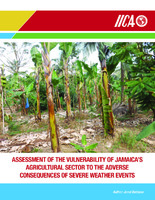| dc.contributor.author | Bedasse, Janet | |
| dc.contributor.author | Instituto Interamericano de Cooperación para la Agricultura (IICA) | |
| dc.contributor.author | Eje Transversal Innovación y Tecnología (ETIT) | |
| dc.contributor.author | Programa de Cambio Climático, Recursos Naturales y Gestión de Riesgos Productivos (PCRG) | |
| dc.coverage.spatial | Kingston, Jamaica | |
| dc.date.accessioned | 2018-12-03T20:48:25Z | |
| dc.date.available | 2018-12-03T20:48:25Z | |
| dc.date.issued | 2018 | |
| dc.identifier.isbn | 978-92-9248-792-8 | |
| dc.identifier.uri | http://repositorio.iica.int/handle/11324/7229 | |
| dc.description.abstract | The report provides a list of recommendations for the agriculture sector in general, and others for specific sub-sectors, all of which can help the sector to adapt to vulnerabilities related to climate variables. In concluding, there is need for the agriculture sector to fully appreciate its vulnerability to climate variability and climate change and prepare accordingly. The list below outlines general considerations for improving sector preparedness.
1) The case studies highlight that farmers are already perceiving changes in the climate, but do not yet fully understand what is happening or what they should do to adapt to those changes. They will require guidance in this regard.
2) The agricultural sector must become more knowledgeable about weather and climate signals and put climate change and climate variability theory into practice.
3) Aggressively promote information on preparing for weather events and best practices that build disaster-resilient agricultural communities.
4) Mainstream climate change considerations into all agricultural sector and sub-sector policies, strategies and action plans.
5) Review the method of reporting on losses from extreme weather events to include the vulnerabilities associated with such losses, along with recommendations for farmers in the different locations.
6) To combat drought, consider adoption of farming techniques used in more arid areas of the world, such as conservation
agriculture and minimum tillage.
7) Consider serious fines for farmers who still engage in the practice of slash and burn, given the strong potential for bush fires during dry conditions.
8) Weather insurance should be integrated strongly into all agricultural operations. | |
| dc.format.extent | 53 páginas | |
| dc.language.iso | en | es |
| dc.publisher | Instituto Interamericano de Cooperación para la Agricultura (IICA) | |
| dc.subject | Impacto ambiental || environmental impact|| impact sur l'environnement || impacto ambiental | |
| dc.subject | Accidentes atmosféricos|| weather hazards ||accident climatique|| acidente meteorológico | |
| dc.subject | Cambio climático||climate change||mudança de clima||changement climatique | |
| dc.subject | Conservación de la naturaleza||nature conservation||conservação da natureza||conservation de la nature | |
| dc.subject | Agricultura familiar||family farms||exploitation agricole familiale||exploração agrícola familiar | |
| dc.subject | Buenas prácticas agrícolas||good agricultural practices||bonnes pratiques agricoles | |
| dc.subject | Horticultura||horticulture||horticultura||horticulture | |
| dc.subject | Innovación||innovation||innovation induite||inovare | |
| dc.subject | sector agrario ||agricultural sector ||secteur agricole|| sector agrícola | |
| dc.subject | gestión de riesgos | |
| dc.subject | Jamaica | |
| dc.subject | Programas de Cooperación Técnica | |
| dc.subject.other | Representación Jamaica | es |
| dc.title | Assessment of the vulnerability of Jamaica’s agricultural sector to the adverse consequences of severe weather events | es |
| dc.type | Libro | es |


